Tired of letting the Italians have all the fun, Pope Clement V ushered in an era of French papal corruption.
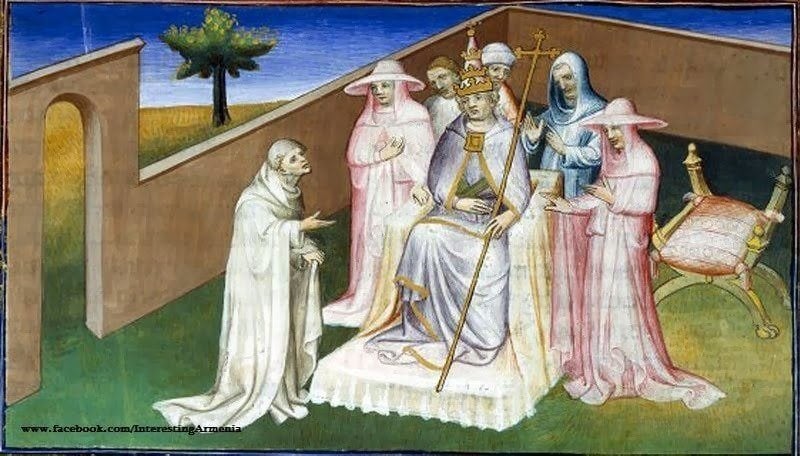
Source: Facts About Armenia
The story of Pope Clement V really begins with his patron, Philip IV (the Fair) of France. Philip spent the first 20 years of his reign, during the late 13th century, overspending on war with the English and court finery back at home. By the early 1300s, his treasury was in trouble and some solution needed to be found. Pope Boniface VIII even condemned Philip for being reckless with money.
Like many modern governments, King Fair tried all kinds of ideas for getting out of debt without actually cutting spending: he seized the assets of Italian bankers, he expelled the Jews and took all of their money, and he debased the currency, which led to riots in Paris. Still facing financial ruin, Philip had a great idea – he would tax the clergy.
Predictably, Rome went insane at the suggestion. Boniface VIII threatened excommunication. Cardinals met in secret to plot Philip’s overthrow. Alliances were sought between the Church and France’s many, many rivals. If Philip was going to make the money he needed without exercising minimal financial discipline, he needed a stooge on the papal throne.
Life Before the Papacy
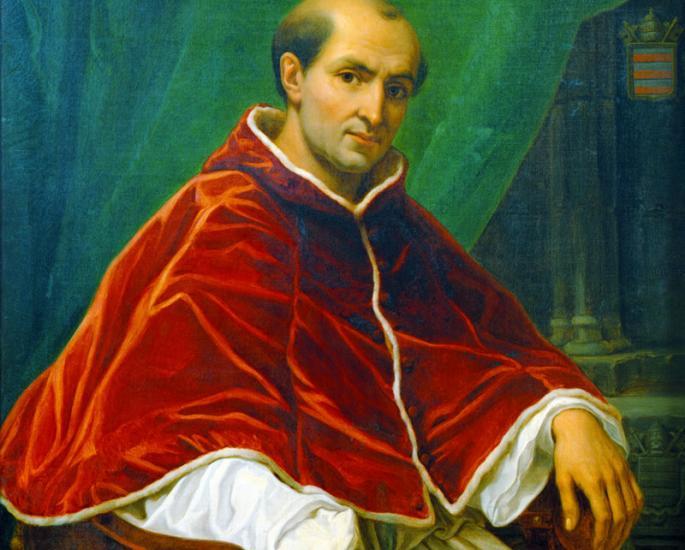
Source: Palais Des Papes
The man who would become Pope Clement V was born Raymond Bertrand de Got, of Aquitaine, France, in 1264. He entered the Church almost as an afterthought, with most of his energy being focused on winemaking and patronizing the arts. His brother had been a very wealthy vintner, and de Got was of noble birth, so it seemed natural to buy himself a bishopric, which was standard practice at the time.
It was actually Boniface VIII who elevated de Got to cardinal’s rank, possibly in an effort to counterbalance the rising influence of other French cardinals. If Boniface thought he was getting a loyal ally in Bordeaux, he was sorely mistaken. Incidentally, Dante would later put Boniface in the Eighth Circle of Hell for selling offices in the church to the likes of de Got.
Election as Pope
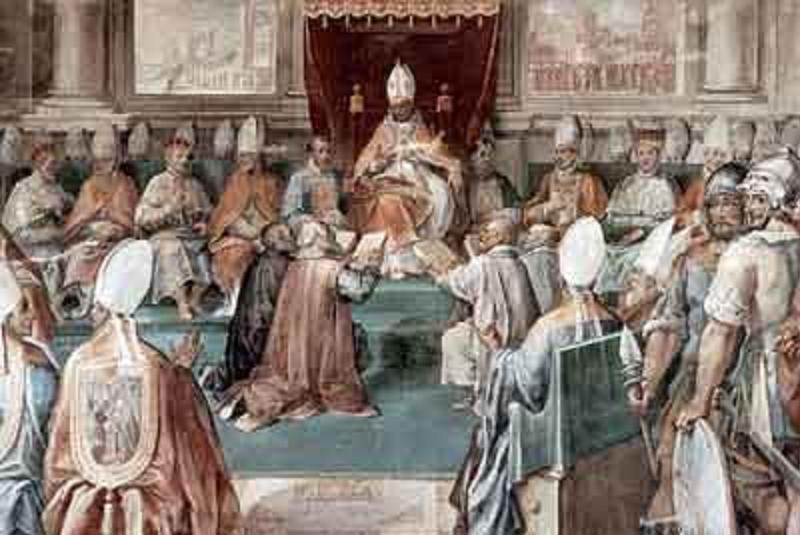
Source: Pinterest
As near as anyone can tell, Boniface’s death in 1303 was a result of natural causes, though the intense pressure that Philip put him under probably didn’t help his fever. Philip, who was becoming ever more obsessed with making the Church ungovernable, began actively meddling in the conclave to select the new pope.
At first, the Italian cardinals resisted Philip’s heavy-handed interference, but when their chosen pope, Benedict IX, was poisoned a few months into his reign, a sizable appeasement faction began to grow in Rome. Making things worse, Philip fomented a split between the French and Italian cardinals that interrupted the proceedings for almost a year. Things were so bad in Rome that the final vote had to be held in Perugia. The compromise winner, in June 1305, was Raymond Bertrand de Got, now Clement V.
Vive la France!
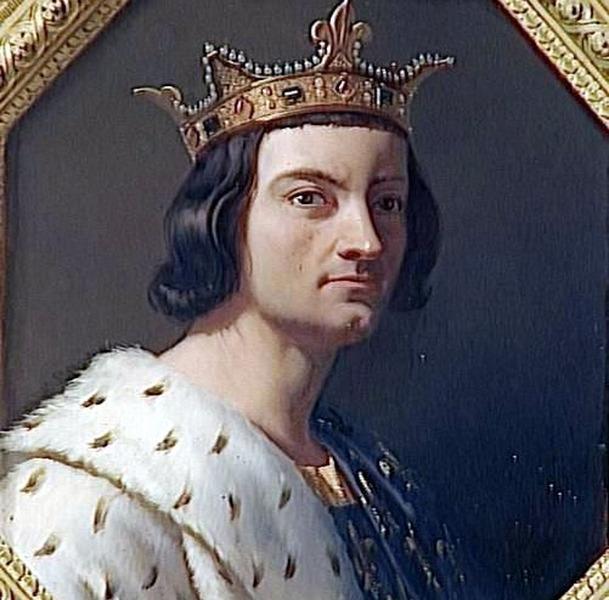
Source: Live Internet
Clement began his reign as he meant to continue it: by stretching the Church over a barrel on behalf of King Philip. The new pope didn’t even travel to Rome for his own coronation, insisting that he be crowned in Lyon instead. Almost his first act was to create nine new French cardinals, all loyal toadies of Philip, to massively outweigh the Italian faction. After this housecleaning, Clement got down to the serious work of being the French king’s prison bitch.
First on the agenda was a little historical revisionism. Boniface VIII had issued a number of bulls against Philip, and that wouldn’t do. Clement published a statement “clarifying” the 1296 bull Clericis Laicos, which had expressly forbidden secular rulers from taxing the clergy, and made it clear that it didn’t apply to so great a leader as Philip IV.
Then he wholly revoked Unam Sanctam, another of Boniface’s bulls asserting the Church’s temporal authority over Philip. If you’ve ever wondered why European heads of state are no longer crowned by the pope, this is part of the reason.
Not content with rewriting canon law to his advantage, Philip demanded more and more concessions from Clement, who was generally more than willing to grant them. Even that wasn’t enough for Philip, however, who demanded that Clement posthumously declare Boniface VIII a heretic and exhume his corpse for a trial. If that sounds weird, remember that it had already happened.
Blushing at the thought of yet another papal grave robbery, Clement V begged off and tried to placate Philip with huge grants of land. Philip kept up the pressure, however, and eventually Clement metaphorically (phew!) dug up Boniface VIII and declared him a heretic and usurper. All this was a bit much, even by Church standards, and a revolt began in Venice, which had to be put down with very expensive mercenaries. Of course, that drove Philip deeper into debt, which sent him looking for new sources of revenue.
Pope Clement V & The Last Crusade
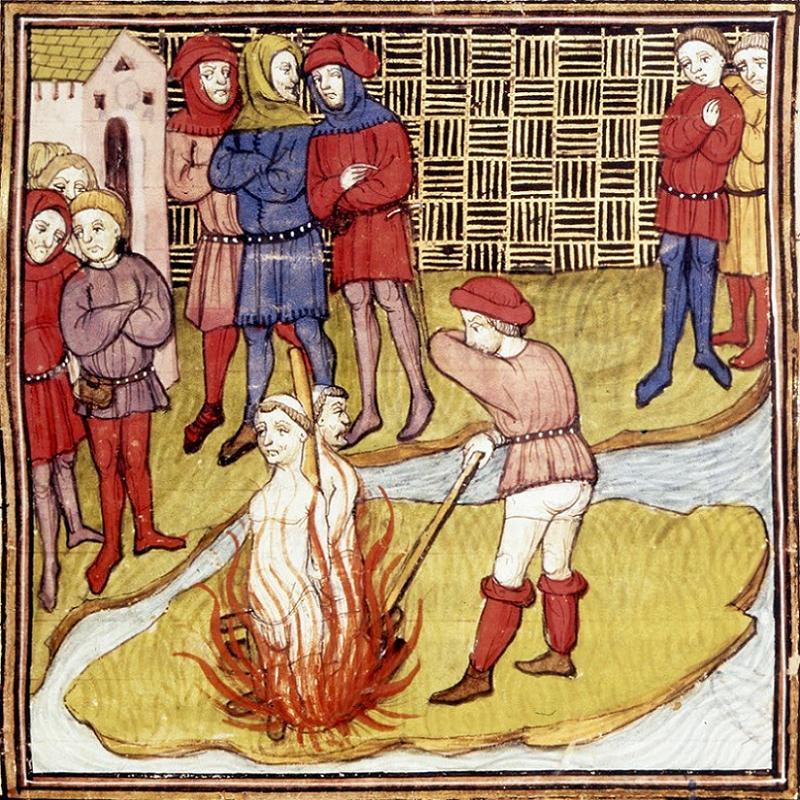
Source: Blog Actualite
Philip found the money he needed among the holy orders of the Hospitallers and the Templars. These knightly orders had both been founded during the Crusades to defend Christians in Palestine. Both grew enormously wealthy from the trade in alms and relics from the Holy Land. When that land was lost to Muslim armies, both orders retired to Europe, where they took up banking. As far as Philip was concerned, they had all the money in the world and no particular use for it.
Acting on Philip’s orders, Clement V summoned the Grand Masters of both orders to face rather convenient charges of heresy in 1306. The Templar Grand Master Jacques de Molay got there first, and Clement launched a diatribe against him for his many crimes and the crimes of his satanic order, a list of charges that included bestiality, paganism, defiling the cross, blasphemy, forgetting to do the dishes before mom comes home, and many, many other offenses. When the Hospitaller Grand Master Fulk de Villaret showed up, he got the same treatment.
Fulk de Villaret was a canny man, and he realized the pope was basically hitting him up for a bribe. He paid, quite a lot, apparently, and secretly accused de Molay of every sin in the Bible. Jacques de Molay, for his part, was less of a realist. He actually seems to have thought being innocent was going to matter when he answered charges.
Refusing to submit to a church audit of his books, his reluctance to just cough up some money cemented his fate. In October 1307, practically the whole French army descended on the Templar’s castles and rounded up almost every member of the order. The “heretics” were mostly burned at the stake, including de Molay, and Philip suddenly wasn’t in debt anymore. In fact, he had enough money to furnish Clement V with a lavish palace in Avignon.
Pope Clement V, having whored the Church to the King of France as thoroughly as he possibly could, died peacefully in the spring of 1314. Philip died later that year, to the relief of just about everybody. The Catholic Church never fully recovered the temporal and moral power it had before Clement V.
Henceforth, European rulers would largely be free to set policy within their own realms, with just a passing nod toward the Church’s will. As for the Papacy itself, it would carry on in Avignon through the next six popes, beginning with Clement’s successor – and illegitimate son – John XXII.






